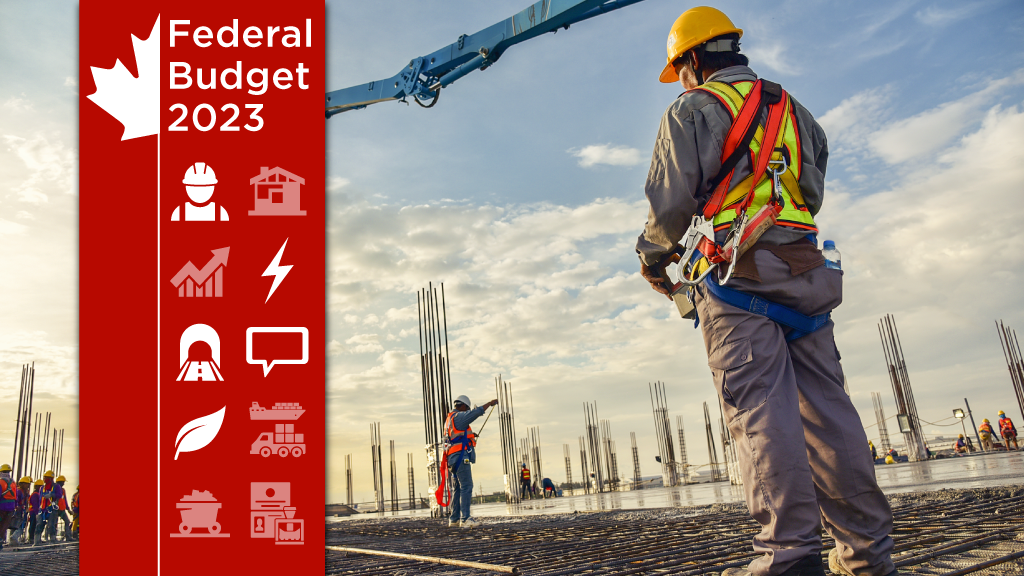Federal budget day 2023 is being declared a banner day for the unionized trades, and its focus on the new green economy is said to represent a significant opportunity for engineers to help shape the new infrastructure Canada will need during a period of transition.
Otherwise, several national stakeholders commenting on the budget stated there were notable omissions among the government priorities unveiled by Finance Minister Chrystia Freeland including a failure to act on the construction sector’s pressing workforce shortage.
Years of advocacy by Canada’s Building Trades Unions were rewarded, said CBTU executive director Sean Strickland, as new clean economy tax credits were introduced by Freeland to put Canada on a more level playing field with the U.S. given the incentives available in the U.S. Inflation Reduction Act.
Importantly, Strickland said, those credits are linked to a prevailing wage pledge that requires union-scale compensation, including benefits and pension contributions.
Historic Day
“It was a historic day for workers in Canada,” said Strickland. “As all workers, union and non-union, prepare to build the new economy in the future, the government has listened and not only did they listen, they put it down on paper that to be eligible for tax credits you have to pay the prevailing wage, and also apprenticeship requirements, which will ensure that we’re creating good middle-class jobs with pensions and benefits and we’re also paving the way for the next generation of tradespeople in this country.”
A new Clean Electricity Investment Tax Credit and a Clean Technology Manufacturing Investment Tax Credit were announced by Freeland on March 28. A Clean Hydrogen Investment Tax Credit was introduced in the 2022 Fall Economic Statement.
“The keys to all of these initiatives is they are being labour-led,” said Strickland. “Labour is at the table.
“When we’re moving away from fossil fuels or moving into hydrogen, small modular reactors and wind and solar, we’re going to be there.”
Also praising the new green energy strategy was the Association of Consulting Engineering Companies – Canada.
ACEC president and CEO John Gamble issued a budget summary that stated, “There was an enormous emphasis placed on attracting investment for major projects to Canada’s shores. We expect in turn that will create an opportunity for further discussions about how best to ensure infrastructure meets the needs of local communities, while connecting Canada’s vast natural resources to a global supply chain.”
The ACEC said it remains unclear whether the clean energy initiatives announced by Freeland will match the “boldness of the Inflation Reduction Act,” and added, “We are beginning to see the funding match the rhetoric around Canada’s new industrial strategy.”
Meanwhile, representatives of the Canadian ��������ion Association (CCA), the Canada Green Building Council (CaGBC), the National Trade Contractors Council of Canada (NTCCC) and the Mechanical Contractors Association of Canada (MCAC) all had criticisms.
MCAC COO Ken Lancastle said the budget failed to recognize and define the role mechanical contractors will play in the green transition and it also had minimal recognition of labour shortages in the sector.
“There’s some disappointment on the part of the association with respect to the lack of acknowledgement of the role our sector is going to have to play in this transition to the green economy,” said Lancastle.
“From some of the programs that were announced yesterday on setting a longer-term vision of Canada, we know there’s some conversation pieces that we can start to have to talk about the important role that the mechanical contracting sector is going to have to play.”
Lack of Vision
Similar criticism, regarding vagueness of vision, came from CCA president Mary Van Buren.
“The budget lacks a vision to advance our economy with a co-ordinated long-term strategy,” she said.
The CCA, ACEC and the NTCCC all said the government was remiss in not addressing its 2021 promise to advance the National Infrastructure Assessment, which the NTCCC has said “could serve as an important vehicle for independent industry advice as it pertains to Canada’s infrastructure needs and capacities.”
The CCA also lamented the lack of attention paid to immigration reform.
“There was very little initiative to recognize the whole need for immigration to be overhauled so that we can attract and retain the workforce that is skilled and contributing to the economy,” said Van Buren.
Both Van Buren and Thomas Mueller, CEO of the CaGBC, suggested the tax credit incentives offered to green technology investors could have been extended to other important sectors.
“We would have liked to see more of the kind of green building-related technologies getting tax incentives,” said Mueller. “You want to replace fossil fuels with clean renewable energy, and the only way you can do that is…through equipment, or you do it through the building envelope.”
Van Buren said, “If a priority is to help Canadian businesses be leaders in green, then incentives should be open to all Canadian companies.”











Recent Comments
comments for this post are closed